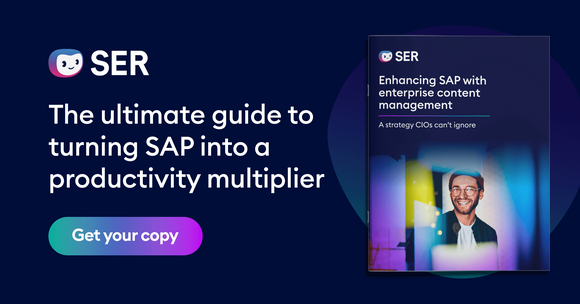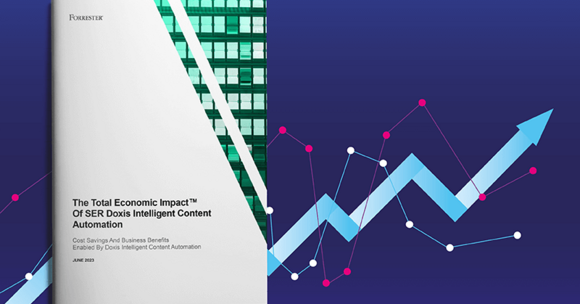SER Blog Innovation & Technology
Your insurance staff crave AI as a productivity superpower
|
A glimmer of hope shines for insurance customers with Gartner’s AI report: 43% of firms are finally warming up to AI and better tech in general. And why does this fact give insurance customers hope? Well, they may finally start to get a taste of a more personalized and streamlined insurance journey comparable with other digital services, like online banking. And nowadays, why shouldn’t dealing with insurance be just as effortless?
And it’s not just customers who will benefit. Going digital and embracing AI tools (the specifics of which we’ll definitely be getting into later) is being seen as a lifeline for insurance staff drowning in claims, helping them step back from the edge of burnout. How close do they need to tread, after all? Be it complex processes or dragged-out resolution times, the average day-to-day is just a massive pain in the backside—an issue that should and can be effortlessly streamlined by integrating better technology into your IT landscape.
But what are the precise pain points that are holding back insurance staff from delivering the very best customer service? A service that is faster and easier to deliver.

The biggest issue is claims overload. A dated, needless burden
Put yourself in your staff’s shoes for a bit. Say it’s Monday morning and you’re an insurance adjuster staring down multiple auto collision claims from the weekend. Each claim involves a tangle of details—driver statements, police reports and photos of bumper bashes and crumpled fenders. You know this drill all too well: hours of data entry, cross-referencing statements and checking coverage nuances. Every new email notification is a reminder of the growing queue, and as you manually match reports to claims, your simple morning coffee turns into a lukewarm reminder of your never-ending to-do list.
The issue extends beyond the workforce to encompass customer experience as well. When staff are overwhelmed, claims processing suffers in both quality and timeliness. This ripple effect means that while employees struggle with burnout and overload, customers face frustrating delays and potentially subpar service. It’s a lose-lose situation that underscores the urgency of addressing these challenges.
So, what exactly is holding decision-makers back from investing in AI solutions that could alleviate these compounding issues? The hesitation seems puzzling, given the clear benefits for both internal operations and customer satisfaction. Are concerns about implementation costs or disruption outweighing the long-term gains? Or is there a fundamental misunderstanding of AI’s potential to transform both the employee and customer experience simultaneously?
It usually boils down to these four hurdles:
- Data complexity and quality: Many insurance companies struggle with fragmented or poor-quality data. For AI to be effective, it requires high-quality, well-structured data.
- Skills gap: Finding and retaining talent with the necessary expertise in AI is a critical barrier, as these skills are in high demand across many industries.
- Cultural resistance to change: Resistance often stems from a lack of understanding of AI's benefits and a fear of the unknown, leading to slow decision-making and adoption processes.
- Regulatory and compliance issues: Concerns about compliance and the ethical use of AI, including data privacy and bias in AI algorithms, pose significant challenges to its broader adoption.

Delvag: Digital insurance processes with ECM
How Delvag uses Doxis for cross-disciplinary claims processes to unfold quality and customer service gains
Read their storyBut the technology out there can easily address these concerns
Fast forward to now and a top-performing AI solution can gather and analyze complex data in a secure and compliant manner and be as easy to handle as your smartphone. These solutions (should) come with interfaces that anyone can use without a hitch and keep the compliance team happy with proper record keeping. Also, any vendor worth their salt should be giving you a robust demonstration where no question is off limits.
But what exactly should you be looking for?
The optimal choice for insurance firms is an intelligent content automation (ICA) platform. ICA is like having a team of tireless, incredibly efficient clerks who've memorized every insurance manual ever written. They'll sift through the mountains of policies, claims, and other bureaucratic whatnots that make up the daily grind of insurance work. But instead of just mindlessly shuffling papers, they actually understand what they're looking at. These clever systems can spot patterns, flag up oddities, and generally make sense of the chaos faster than you can say "comprehensive coverage." They’ll play nice with your existing computer systems too, slotting in like the missing piece of a particularly complex jigsaw puzzle.
ICA is a perfect solution for staff who crave:
- Tech that helps them work faster, communicate more efficiently and get through underwriting and claims processes in record time.
- The idea of having all customer info neatly organized, so they can give speedy responses to impatient claimants.
- When it comes to settlements and underwriting, they want to get things done ASAP by quickly gathering the right docs and making the whole process clearer.
- Anything that takes boring tasks off their hands, like capturing data, filing, creating policies and keeping track of deadlines.
Want to take a deeper dive into what ICA can do for insurance providers like you? See how SER transforms the working lives of insurance providers with Doxis.
Selecting the right solution is not a decision to be taken lightly
But it is a decision you absolutely must start making. Experienced and skilled insurance staff will always be in high demand, and hopping from one job to another has never been easier. Sure, a hefty paycheck is nice, but just like in any other situation where price isn't everything, your recruitment game is no different. Being able to offer a streamlined work routine – and therefore a better work-life balance – is a huge selling point. It can and will see team members (and prospective employees) flying to greener pastures if you can’t deliver.
Just check out the data below from Zippia. Over 50% of the staff surveyed say work-life balance is a job deal breaker, second only to a long commute.

And whether your team loves building relationships with customers, helping them protect what matters most or finding creative solutions to complex problems, there's a lot to adore about insurance work. A less bloated nine-to-five (or eight-to-seven for many) will help your agents focus on more fulfilling, value-added aspects of their job—likely the very reasons they got into this line of work in the first place. They shouldn't have to get bogged down in admin. They shouldn’t have to manually trawl through streams of data. They shouldn’t have to jump ship to protect their mental health. And they definitely shouldn’t disappoint customers with snail-paced claim resolution as a result of inefficient systems and processes.
With employee experience pivotal to your success, and if you're feeling the urgent need to modernize, explore our essential guide to digitizing document management.
But your investment is important too. A few things to look for when selecting a vendor:
- All-in-one: Look for a platform that handles everything related to documents, processes, and collaboration so you don't need separate tools.
- Flexible and scalable: The platform should be easy to set up and change as your business grows or needs change.
- Cutting edge: Choose a platform that has a proven track record of boosting efficiency, seamlessly integrates AI, and makes data-driven decisions to transform your insurance operations and minimize risks.
- Works everywhere: The ICA planform should work across all departments and locations, making it easy to manage everything in one place.
- Secure and compliant: Make sure the platform protects your information and follows internal governance guidelines and regulatory laws.
It’s no longer a question of ‘if’ or ‘when’, but ‘how’
The demand for efficiency in insurance isn't just coming from customers—it's echoed loudly by your employees too. Balancing both these crucial needs is where intelligent content automation (ICA) and generative AI truly shine. By adopting a leading solution from a trusted vendor, insurers can transform both customer and employee experiences simultaneously. This means faster claims processing and more accurate underwriting for clients, while staff enjoy reduced manual workload and enhanced decision-making support. The question isn't whether to embrace these technologies, but how to implement them effectively to stay competitive in today's rapidly evolving market.
So if you’re still not convinced, go ahead and check out Gartner’s report on how AI, especially generative, is transforming insurance, or get in touch. We’re here to help.
The latest digitization trends, laws and guidelines, and helpful tips straight to your inbox: Subscribe to our newsletter.
How can we help you?
+49 (0) 30 498582-0Your message has reached us!
We appreciate your interest and will get back to you shortly.




